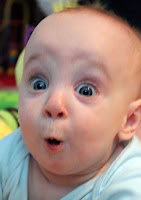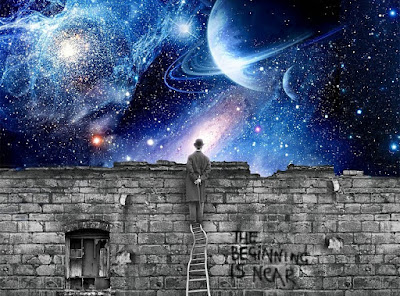"People like us, who believe in physics, know that the distinction between past, present, and future is only a stubbornly persistent illusion."
-- Albert Einstein (1879-1955), theoretical physicist
I was afraid this was going to be too similar to another post I wrote just recently but, no, not too similar. The titles are not the same, at any rate. "Here" is now "Near" so I'm okay, I suppose. And, besides, I couldn't really plagiarize myself, right? I might be a tad redundant, though. I am known for being that.
The beginning is near? Actually, it may have already happened, is happening right now, or it may, very well, be near. Einstein and I agree on time being "a stubbornly persistent illusion." I didn't use theoretical physics to arrive at our conclusion; I'm not that intelligent. I am, however, with all humility and my mother's constant reminder, pretty darn smart. The conclusion, for me, simply made perfect sense. Time doesn't really exist but, rather, is a human construct which gives a sense of structure to our reality. If we think something, it then begins to exist.
“Time is a created thing. To say 'I don't have time' is like saying, 'I don't want to.”
-- Laozi (6th cen. BC), philosopher, witer
Somewhere in "time," we realized there was a past, a now, and a future. Somewhere in "time," we also assumed the universal laws required time to move in a forward, linear, direction from past to present, and then to the future. Why? Well, because we've never been able to go backward, so we must not be able to. We've never been able to go faster than the speed of light, either, and yet we are finding it might be, theoretically, possible.
But, this really isn't where I want to go with this post, basically because I realize being "smart" isn't, necessarily, the same as being "intelligent." Humility will ultimately remind me, usually when my brain works faster than my accumulated knowledge, that I am sounding like a pig staring at a wristwatch and describing its supposed function to my fellow Suidae. Not a good thing. And there is also the very good likelihood that a member of the League of the Perpetually Offended will call me down on something I misstate, regardless of what they know I meant to say. It is what they do, after all.
“Yesterday is gone. Tomorrow has not yet come. We have only today. Let us begin.”
-- Mother Theresa (1910-1997), "Saint Teresa of Calcutta"
What I really intended was to remind everyone of the "now," and the very real importance of living in it. The hardest thing for most folks is losing their linear sense of time. We insist on either living in the past or worrying over the future. We have no control over our past. We have little control over our fate, our future. As they say, we should not worry over those things which we have little or no control. We do have control of our present, our now. What we do in the now is a reflection of what we have been through in our past. The now is based on lessons we 've learned which will be the impetus for the choices we make. Those choices will be the basis for our circumstances tomorrow and, perhaps, those circumstances will be new lessons we will layout for ourselves.
But, what if time isn't linear? We might find a way to travel backward in it and change stuff, right? Okay, let's get a grip on some possible realities of this. If we could go back in time to change things, we already have, and this is why we are where we are now. If we could have prevented an assassination, we would have, but we didn't, or couldn't, at least... not in this dimension. There is another thought which says if you change the past it will then branch off into another reality, an "alternate universe," because, when you return to your point of origin, arrive back at the "now," nothing has changed in the original reality you traveled from. Theoretically, we cannot create a paradox. The only way to enjoy the change of the "new" timeline, is to stay at that timeline. Will you meet yourself, if you stay? Chances are the change you create might just prevent your birth in the new timeline, but I'd be careful - if you share your father's name, do not fall in love with a woman who shares your mother's. You may find it a bit weird.
You might enjoy reading this short article: Paradox Lost.
Physicists believe that the universe started as a very simple, extremely compact ball of energy. Although the laws of physics themselves don’t provide for an arrow of time, the ongoing expansion of the universe does. As the universe expands, it becomes ever more complex and disorderly. The growing disorder—physicists call it an increase in entropy—is driven by the expansion of the universe, which may be the origin of what we think of as the ceaseless forward march of time.
-- Tim Folger, Discover Magazine, "Newsflash: Time May Not Exist
If there is no one around to hear a tree fall in the woods, does it make a sound? If there is no one around to witness, well, anything, does time actually pass in the manner we define it, or has it always been something more complex and so much less linear?
I can't help but wonder; if Gravity can affect time what are the chances other forces can have an effect, as well? What are the chances the human mind can bend time to its will and take us through time, forward or backward, to past lives or life not yet lived? In this way, might we be our own past or future conscience? Or, perhaps we lost our heart to someone many lifetimes ago, losing our balance for eternity or until we change a choice we made, not realizing the lost love is probably here, somewhere in this "now," with us and feeling the same loss or confusion. Ah, sweet romance! My head hurts.
From ancient Greece, the philosophers Plato and Socrates might leave us with this final thought: The only thing any of us knows for sure is that we know nothing, for sure.
Look, and see the beginning is near. Turn around, and see the past as near as the beginning. Pay attention, and realize "now." Where we think to be is often where we are, but not in the way we really want. Perhaps we will find our way, sooner or later, but not right now. Maybe our way exists in the eternal moment we can only find between the ticks of a clock... when time stands still.
I can't help but wonder; if Gravity can affect time what are the chances other forces can have an effect, as well? What are the chances the human mind can bend time to its will and take us through time, forward or backward, to past lives or life not yet lived? In this way, might we be our own past or future conscience? Or, perhaps we lost our heart to someone many lifetimes ago, losing our balance for eternity or until we change a choice we made, not realizing the lost love is probably here, somewhere in this "now," with us and feeling the same loss or confusion. Ah, sweet romance! My head hurts.
From ancient Greece, the philosophers Plato and Socrates might leave us with this final thought: The only thing any of us knows for sure is that we know nothing, for sure.
Look, and see the beginning is near. Turn around, and see the past as near as the beginning. Pay attention, and realize "now." Where we think to be is often where we are, but not in the way we really want. Perhaps we will find our way, sooner or later, but not right now. Maybe our way exists in the eternal moment we can only find between the ticks of a clock... when time stands still.
“How did it get so late so soon?”
-- Theodor "Dr. Seuss" Geisel (1904-1991), illustrator. philosopher. author
 Before you go getting your panties in a bunch, it is essential to understand that this is just an opinion site and, as such, can be subjected to scrutiny by anyone with a differing opinion. It doesn't make either opinion any more right or wrong than the other. An opinion, presented in this context, is a way of inciting others to think and, hopefully, to form opinions of their own, if they haven't already done so. This is also why, occasionally, I will present an "opinion" just to stir an emotional pot. Where it may sound like I agree with the statements made, I'm more interested in getting others to consider an alternate viewpoint.
Before you go getting your panties in a bunch, it is essential to understand that this is just an opinion site and, as such, can be subjected to scrutiny by anyone with a differing opinion. It doesn't make either opinion any more right or wrong than the other. An opinion, presented in this context, is a way of inciting others to think and, hopefully, to form opinions of their own, if they haven't already done so. This is also why, occasionally, I will present an "opinion" just to stir an emotional pot. Where it may sound like I agree with the statements made, I'm more interested in getting others to consider an alternate viewpoint.
It is my fervent hope that we keep open and active minds when reading opinions and while engaging in peaceful and constructive discussion, in an arena of mutual respect, concerning those opinions put forth. After over twenty years with military intelligence, I have come to believe engaging each other in this manner and in this arena is the way we will learn tolerance and respect for differing beliefs, cultures, and viewpoints.
We all fall from grace, some more often than others; it is part of being human. God's test for us is what we learn from the experience, and what we do afterward.
Pastor Tony spent 22 years with United States Air Force Intelligence as a planner, analyst, briefer, instructor, and senior manager. He spent 17 years, following his service career, working with the premier, world renowned, Institutional Review Board helping to protect the rights of human subjects involved in pharmaceutical research. Ordained 1n 2013 as an "interfaith" minister, he founded the Congregation for Religious Tolerance in response to intolerance shown by Christians toward peaceful Islam. As the weapon for his war on intolerance he chose the pen, and wages his "battle" in the guise of the Congregation's official online blog, The Path, of which he is both author and editor. "The Path" offers a vehicle for commentary and guidance concerning one's own personal, spiritual, path toward peace and the final destination for us all. He currently resides in Pass Christian, Mississippi, where he volunteers as lead Chaplain and Chaplain Program Liaison, at the regional medical center.






